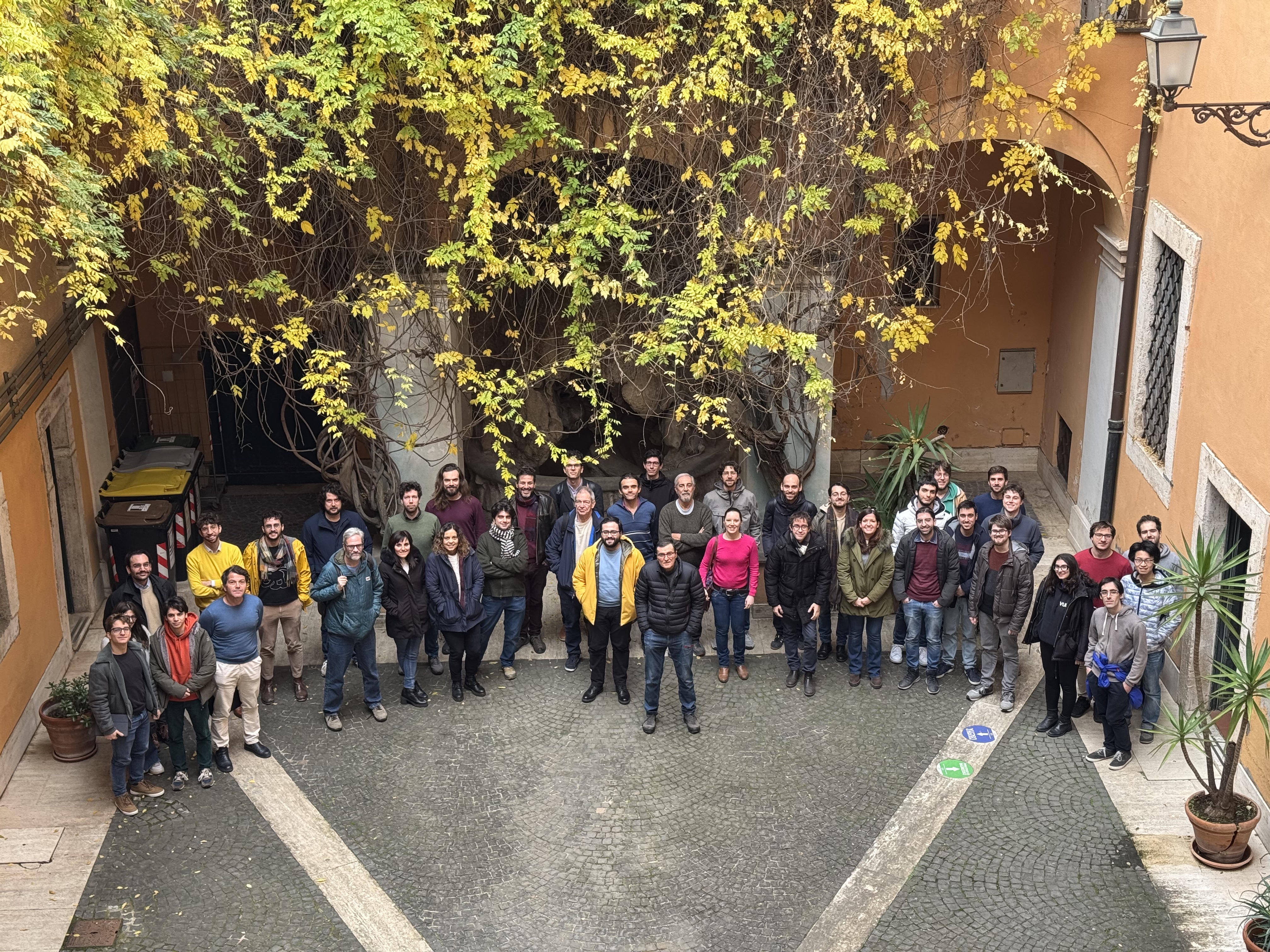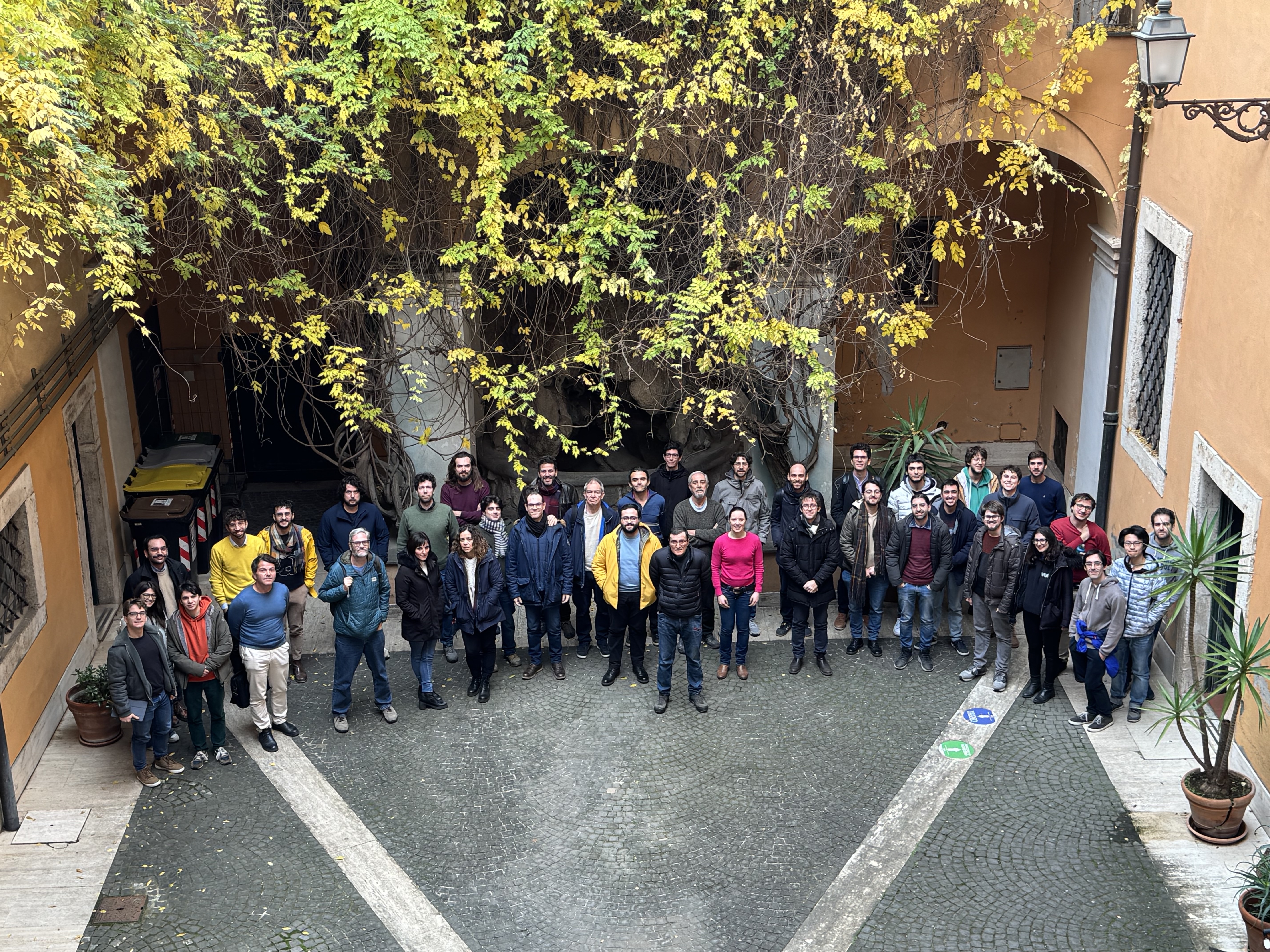Winter Meeting in Algebra and Geometry
Rome : December 18 - 19 2024


Speakers
| Name | Institution |
|---|---|
| Fabio Bernasconi | Sapienza Unviersity of Rome |
| Francesco Brenti | University of Rome "Tor Vergata" |
| Francesca Carocci | University of Rome "Tor Vergata" |
| David Hernandez | Université Paris-Cité |
| Samouil Molcho | Sapienza Unviersity of Rome |
| Rachel Newton | King's College London |
| Gregory Pearlstein | University of Pisa |
| Edoardo Sernesi | Roma Tre University |
| Sara Torelli | Roma Tre University |
Venue
Aula Urbano VIII dell’Argiletum (Università Roma Tre, Dipartimento di Architettura), Via della Madonna dei Monti, 40 – 00184 Roma
History. Since 2011, the Algebra and Geometry research groups of the three main universities in Rome (Sapienza, Tor Vergata and Roma Tre University) have undertaken the tradition of organizing a winter meeting to bring together local and world-wide researchers and to foster collaborations and exchange of ideas. Each time, a variety of topics in Algebra and Geometry is selected to be showcased.
Previous Editions: 2023, 2022, 2021, 2019 and 2018.
Organizers. Domenico Fiorenza, Martina Lanini, Guido Lido, Francesco Meazzini, Luca Schaffler, and Amos Turchet
Abstracts
Abstract: A 3-dimensional del Pezzo fibration \(X \to C\) is one of the possible outcomes of the MMP. One aims to study the birational geometry of \(X\) in terms of the generic fibre \(X_{k(C)}\) and the base curve \(C\). In positive characteristic, an additional difficulty arises: there are examples where all the fibres of a del Pezzo fibration are singular. In this talk, we explain these examples and describe how to bound such pathological cases. We extend two classical results of Enriques and Manin: (1) a 3-dimensional del Pezzo fibration over a curve, defined over an algebraically closed field, always admits a section; and (2) the total space is rational if the base curve is \(\mathbb{P}^1\) and the anticanonical degree of a fibre is at least 5. This is joint work with H. Tanaka.
Abstract:I will define Coxeter groups and their Kazhdan-Lusztig polynomials, and briefly explain the significance of the polynomials. I will then state the long-standing Combinatorial Invariance Conjecture, and survey the main partial results that are known about it, with an emphasis on recent developments.
Abstract: Gromov-Witten invariants are defined via intersection theory on Kontsevich's space of stable maps. The latter is very singular, with many irreducible components of different dimensions. As a consequence the invariants are difficult to compute and to interpret. In this talk I will explain how to construct smooth modular compactifications of maps to projective space in low genus. The construction will involve tropical techniques and the study of curve singularities worst than nodal. This is based on a joint work with L. Battistella.
Abstract: We introduce a monoidal analogue of Jantzen filtrations in the framework of monoidal categories with generic braidings. It leads to a deformation of the multiplication of the Grothendieck ring. We conjecture, and we prove in many remarkable situations, that this deformation is associative so that our construction yields a quantization of the Grothendieck ring. This is a joint work with Ryo Fujita.
Abstract: Let \(\mathcal{A}_g\) denote the moduli space of principally polarized Abelian varieties. As in the case of the moduli space of curves, the Chow ring of \(\mathcal{A}_g\) is intangible, but contains a much better understood tautological subring. But unlike for curves, there is a much tighter connection between the Chow ring and the tautological ring of \(\mathcal{A}_g\). In the talk, I will discuss the construction of a ``tautological projection" operator, that is, a way to canonically decompose any algebraic cycle on \(\mathcal{A}_g\) into a tautological and a non-tautological part. I will then survey the major known results about the projections of natural cycles, some ongoing work, and some conjectures. Based on joint work with Canning-Oprea-Pandharipande.
Abstract: I will describe some local-global principles used in the study of rational points on algebraic varieties, and the Brauer–Manin obstruction which can explain failures of these local-global principles. I will then discuss some joint work with Martin Bright concerning the primes playing a role in the Brauer–Manin obstruction for varieties with torsion-free geometric Picard group, such as K3 surfaces.
Abstract: I will discuss joint work with Chris Peters which extends rigidity results of Arakalov, Faltings and Peters to period maps arising from families of complex algebraic varieties which are non-necessarily proper or smooth. Inspired by recent work with P. Gallardo, L. Schaffler, Z. Zhang, I will discuss two classes of elliptic surfaces which can be presented as hypersurfaces in weighted projective spaces which have a unique canonical curve. In each case, we will show that infinitesimal Torelli fails for \(H^2\) of the compact surface, but is restored when one considers the period map for the complement of the canonical curve.
Abstract: I will discuss some questions on plane curves which involve logarithmic vector fields and provide a new viewpoint on classical problems and results.
Abstract: Under the assumption that the adjusted Brill-Noether number \(\widetilde{\rho}\) is at least \(-g\), we prove that the Brill-Noether loci in \(\mathcal{M}_{g,n}\) of pointed curves carrying pencils with prescribed ramification at the marked points have a component of the expected codimension with pointed curves having Brill-Noether varieties of pencils of the minimal dimension. We then show that analogous loci of curves in Severi varieties on K3 surfaces provide curves with non-general Brill-Noether behaviour and give applications to study correspondences and cycles on K3 surfaces. This is a work with Andreas Leopold Knutsen.
Schedule
| Time | Wednesday 18 | Thursday 19 |
|---|---|---|
| 9:30 - 10:20 | Pearlstein | Bernasconi |
| 10:30 - 11:20 | Torelli | Newton |
| 11:20 - 11:50 | Break | |
| 11:50 - 12:40 | Molcho | Sernesi |
| 12:40 - 14:30 | Lunch Break | |
| 14:30 - 15:20 | Brenti | |
| 15:30 - 16:20 | Carocci | |
| 16:20 - 16:50 | Break | |
| 16:50 - 17:40 | Hernandez | |
Funding and Sponsors
The conference is supported by the following projects
- PRIN 2022: Semiabelian varieties, Galois representations and related Diophantine problems (local P.I. Fabrizio Barroero).
- Rita Levi Montalcini Grant "Birational geometry of compact moduli spaces via singularity theory and point configurations."
- MIUR Excellence Department Project MatMod@TOV awarded to the Department of Mathematics, University of Rome Tor Vergata.
- Fondi Ateneo 2022 Sapienza Università di Roma.

We thank the Department of Architecture of the University Roma Tre for the use of the Aula Urbano VIII.